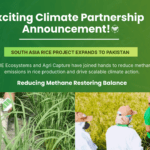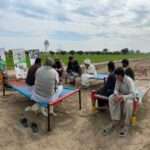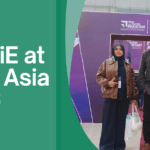News
SAWiE’s Impactful Presence at the International Soil and Water Forum 2024 (Bangkok)
The International Soil and Water Forum 2024, jointly hosted by the Food and Agriculture Organization (FAO) and the Ministry of Agriculture and Cooperatives, Thailand, was held in Bangkok with resounding success. The event brought together over 600 participants from 55+ countries, including policymakers, industry leaders, researchers, and innovators, to discuss sustainable solutions to global soil and water challenges. The Forum aimed to tackle challenges such as water scarcity, soil degradation, and climate change, aligning efforts with global goals like SDG13 on Climate Action and land degradation neutrality.

Top News
Forum Themes
Theme 1: Managing Water Scarcity
Key Insights:
- Challenge: 3.2 billion people live in areas with high water shortages (SOFA 2020).
- Focus Areas: Water accounting, equitable allocation, water governance, and development of National Water Roadmaps.
- Statistics: Agricultural activities consume 70% of global freshwater, and by 2050, 50% of the population will face water shortages.
- Discussions: Emphasized resilience-building through innovative governance and strategies for water sustainability.
SAWiE Participation:
- Engaged with technical panelists discussing water stewardship and management practices in Asia.
- Highlighted SAWiE’s initiatives on water conservation and the use of AWD irrigation to reduce water consumption in rice farming.
Theme 2: Reversing Land Degradation and Boosting Land Restoration
Key Insights:
- Challenge: 58% of degraded land is agricultural; 95% of food is produced from land under stress.
- Focus Areas: Integrated land use planning, sustainable land management, and soil recarbonization.
- Discussions: Restoration needs urgent investment and policy support to meet global targets for land degradation neutrality.
SAWiE Participation:
- Attended sessions on land degradation neutrality and shared SAWiE’s expertise in integrating crop residues and soil fertility enhancement.
- Networked with participants from Bhutan and Nepal, learning about their sustainable land management practices.
Theme 3: Sustainable Soil Management
Key Insights:
- Challenge: Soil erosion, salinity, and nutrient imbalances threaten food security.
- Focus Areas: Soil erosion monitoring, salinity management, and sustainable land-use practices.
- Statistics: 93% of agricultural soil globally is salt-affected, impacting 2.4 billion people living in poverty.
SAWiE Participation:
- Contributed to discussions on sustainable soil practices, emphasizing SAWiE’s work with biochar to enhance soil health.
- Engaged with experts to explore solutions for mitigating soil salinity.
Theme 4: Integrated Climate-Resilient Land, Soil, and Water Management
Key Insights:
- Challenge: Climate change exacerbates soil degradation and water scarcity, threatening food security.
- Focus Areas: Governance, bioeconomy strategies, and sustainable financing for integrated management.
- Outcome: Scaling integrated approaches was emphasized to enhance resilience in agrifood systems.
SAWiE Participation:
- Presented SAWiE’s role in promoting regenerative farming and its alignment with climate-smart agriculture objectives.
- Actively participated in discussions on bioeconomy and sustainable financing for smallholder farmers.
Event Highlights
1. Global Perspectives on Soil and Water Sustainability
The forum featured high-profile speakers and sessions addressing urgent issues, such as:
- Water resource governance: Exploring solutions for growing water scarcity.
- Soil regeneration: Combating degradation and boosting productivity.
- Climate-smart practices: Scalable innovations for a sustainable future.
Dr. Thanawat Tiensin, Director of FAO’s Office for Asia and the Pacific, emphasized:
“To ensure food security for future generations, we must prioritize restoring our soils and managing water resources effectively. Collaboration is the cornerstone of achieving sustainable development goals.”
2. Cutting-Edge Statistics and Insights
- Over 93% of global soils are degraded, affecting crop yields and ecosystems.
- Agriculture accounts for nearly 70% of global freshwater usage, highlighting the critical need for innovative water management solutions.
- Digital agricultural tools can boost productivity by up to 25% when effectively utilized.
SAWiE’s Contributions at the Forum
A. Panel Discussions
SAWiE actively participated in multiple sessions, showcasing its expertise in:
- Climate-Smart Solutions: Shared the success of our water-saving techniques like the Alternate Wetting and Drying (AWD) technique in rice cultivation, reducing water use by 38% while maintaining yields.
- Soil Health Innovation: Presented findings on the integration of crop residues, which improves soil organic matter and enhances nitrogen use efficiency by up to 30-35%.
- Digital Empowerment: Highlighted the effectiveness of SAWiE’s mobile advisory platforms in guiding thousands of farmers on sustainable practices.
- Live demonstrations of traceability tools for supply chain transparency from farm to market.
- Videos showcasing the impact of our climate-smart projects in Pakistan.
- Distribution of informational resources to hundreds of attendees.
C. Networking and Collaboration
SAWiE engaged with representatives from:
- FAO: Discussed potential partnerships for expanding AWD adoption.
- Private Sector Innovators: Explored collaborations with tech companies to enhance digital advisory services.
- Global NGOs: Identified opportunities to scale soil regeneration projects in Pakistan and beyond.
Speaker Quotes That Resonated
Kylie Porter, Head of Sustainability at SunRice, remarked:
“Sustainability is not an option but a necessity. Digital tools and resource-efficient farming practices are pivotal in achieving resilience in agriculture.”
Mr. Haji Muhammad, SAWiE’s Manager Regen. Farm Advisory stated:
“At SAWiE, we are committed to empowering farmers with knowledge and tools to address the dual challenge of water scarcity and soil degradation. Forums like this are essential for creating synergies across borders.”
Key Outcomes and Learnings for SAWiE
- Enhanced Visibility:
- Demonstrated Pakistan’s leadership in climate-smart agriculture.
- Reached over 600+ stakeholders, including policymakers and researchers.
- Valuable Insights:
- Gained knowledge about advanced soil regeneration techniques and global water governance strategies.
- Identified the role of data-driven policies in addressing climate challenges.
- Collaborative Opportunities:
- Initiated dialogues with global agencies for funding and technical support.
- Explored partnerships to scale AWD and biochar applications in Pakistan.
1. Scaling Impact
SAWiE aims to:
- Expand AWD and biochar adoption to benefit 50,000+ farmers in Pakistan by 2025.
- Enhance digital advisory platforms to cover climate resilience strategies for diverse crops.
2. Building Partnerships
We will leverage connections established at the forum to:
- Collaborate with international stakeholders on knowledge exchange.
- Mobilize resources for large-scale implementation of sustainable farming practices.
3. Advocacy and Awareness
SAWiE will continue to advocate for policies that prioritize:
- Sustainable water management.
- Soil health improvement.
- Support for smallholder farmers.
Join Us in Transforming Agriculture
SAWiE is proud to have contributed to the International Soil and Water Forum 2024 and remains dedicated to addressing the challenges of sustainable agriculture through innovation, collaboration, and action.



